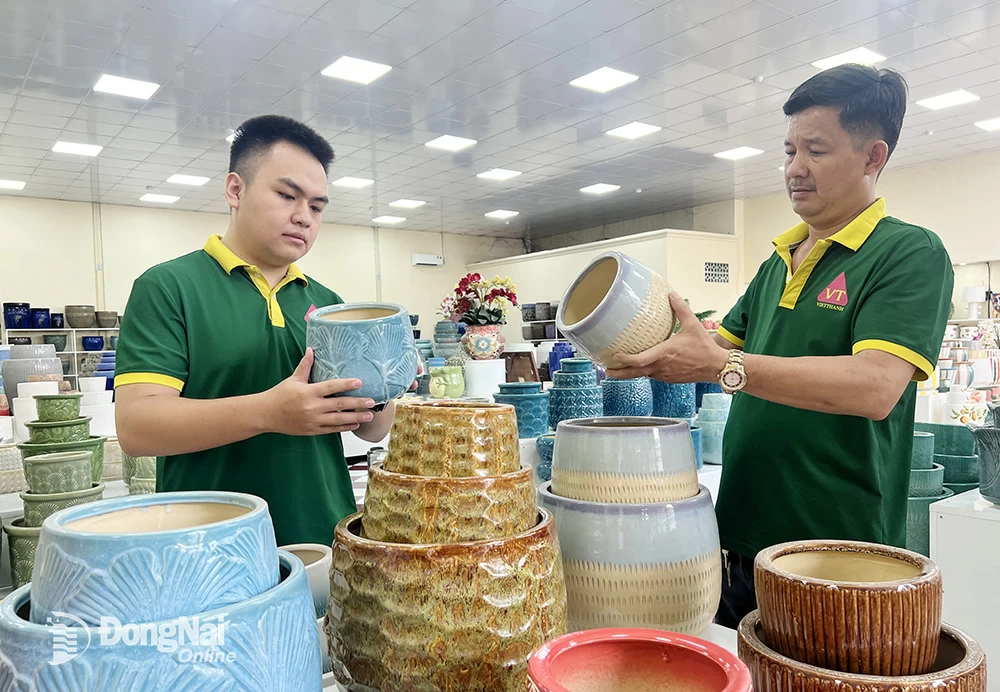 |
| Many businesses are eager to support the building and development of brands and geographical indications for Bien Hoa ceramic products. In the photo: The product display area of Viet Thanh Ceramic Joint Stock Company (Bien Hoa city). Photo: L. Phuong |
Simultaneously, as science and technology, e-commerce, and artificial intelligence (AI) applications continue to develop, intellectual property rights (IPR) are playing an increasingly important role in creating a foundation for the sustainable development of Vietnamese businesses.
Many challenges arise as e-commerce and AI technology develop.
The development of e-commerce is a global trend. Besides its positive aspects, many individuals and entities are also exploiting this form of commerce to trade counterfeit goods, causing harm to consumers, the fair competitive environment, and the economic development and business operations of enterprises.
According to Phan Minh Nhựt, Chairman of the Association for Combating Counterfeiting and Protecting Intellectual Property Rights of Foreign-Invested Enterprises in Vietnam (VACIP), intellectual property rights holders must further enhance and strengthen their activities in protecting and enforcing intellectual property rights in the increasingly developing e-commerce environment.
According to Mr. Phan Minh Nhut, "made in Vietnam" goods are a reputable brand, bringing great value to businesses in Vietnam. Therefore, the production and sale of counterfeit goods bearing these brands will have a significant impact on brand reputation and product origin in the market, especially when related to e-commerce activities.
In April 2025, the Department of Science and Technology organized the Conference on AI Products and Intellectual Property: Opportunities for Exploration and Related Legal Issues. At the conference, in light of the development of AI technology and applications, experts argued that businesses and localities cannot remain outside this trend, especially since policies for AI development and the legal framework are still not entirely clear. Authorities need to focus on building a legal framework to regulate legal relationships related to AI, such as property rights, ownership, intellectual property, labor relations, and compensation for damages.
According to Tran Giang Khue, Head of the Ho Chi Minh City Representative Office of the Intellectual Property Office, forms of intellectual property infringement arising in the digital environment, and cross-border intellectual property infringement, pose many legal issues regarding intellectual property for entities, businesses, and localities in the AI era. These include issues related to authorship and co-authorship; protection of "intellectual property" created by AI; management and enforcement; exploitation of intellectual property rights; and handling and prevention of counterfeiting violations.
According to statistics from the National Steering Committee against Smuggling, Commercial Fraud, and Counterfeit Goods (National Steering Committee 389), in the first quarter of 2025, units and localities seized and processed more than 30,600 violations; of which about 1,100 cases were related to counterfeit goods and intellectual property violations.
Strengthening business support programs
Brand identity is always a concern for many businesses in today's increasingly competitive market. Beyond price, product quality, and service, businesses are increasingly developing their brand identity and conveying their core values. This helps them both enhance competitiveness and mitigate risks related to intellectual property rights.
Businesses, whether involved in production and business activities to a greater or lesser extent, are always related to intellectual property rights (IPR), brand development, and product and service branding. IPR is considered a valuable asset for businesses. In particular, IPR related to industrial property rights is becoming increasingly important in the production, business, and circulation of goods for each organization and business unit.
Intellectual property rights, especially trademarks and trade names, are increasingly playing a crucial role in corporate brand development strategies, particularly in the context of the growing e-commerce and digital technology sectors.
Ms. Nguyen Thi Dao, owner of Minh Dao Honey Production Facility (in Hang Gon commune, Long Khanh city), said that her facility's honey product has been recognized as a 3-star OCOP (One Commune One Product Program) product and has been registered for intellectual property rights. This creates favorable conditions for the facility to focus on promoting the brand of its main product, Long Khanh rambutan flower honey, as well as expanding market development through e-commerce channels.
In Dong Nai province, the Provincial People's Committee has approved the Dong Nai Provincial Intellectual Property Development Program until 2030. The program aims to ensure that by 2030, at least 60% of products will be recognized as key, distinctive products and services of the province; products associated with the OCOP program will receive support for registration, management, and development of intellectual property, as well as control over origin and quality after protection; and the number of trademark applications from businesses in the province will increase by an average of 8-10% per year.
In addition, the province will support the creation and registration of patents, industrial designs, trademarks, and new plant varieties both domestically and internationally; support the development, management, and promotion of certification marks, collective marks, and geographical indications for local specialties, handicraft products, and unique local products. Simultaneously, it will strengthen the capacity and effectiveness of intellectual property rights enforcement and promote intellectual property protection in the digital environment…
Lam Phuong
Source: https://baodongnai.com.vn/kinh-te/202505/chu-trong-so-huu-tri-tue-trong-thoi-dai-so-e5c5989/


![[Photo] Enchanting ancient rose garden on the mountainside in Nghe An](/_next/image?url=https%3A%2F%2Fvphoto.vietnam.vn%2Fthumb%2F1200x675%2Fvietnam%2Fresource%2FIMAGE%2F2025%2F12%2F19%2F1766109900916_vuon-hong-chin-do-thu-hut-du-khach-toi-check-in-o-ha-noi-3-20162778-1671624890024-1671624890104198100259.jpeg&w=3840&q=75)



![[Photo] General Secretary To Lam visits the exhibition space showcasing books, photo exhibitions, and achievements of digital transformation in journalism.](/_next/image?url=https%3A%2F%2Fvphoto.vietnam.vn%2Fthumb%2F1200x675%2Fvietnam%2Fresource%2FIMAGE%2F2025%2F12%2F19%2F1766110879215_1766110240024-jpg.webp&w=3840&q=75)

































































































Comment (0)